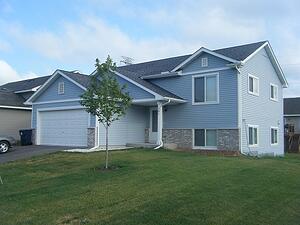First-Time Homebuyer Guide
First-Time Homebuyer Guide
Are you dreaming of buying your own home for the first time? Have you spent years moving from rental to rental, but now you’re looking to settle down somewhere? That’s fantastic! Becoming a first-time homebuyer is a wonderful goal, and with time, proper preparation, and knowledge of what you can afford, you’ll be able to achieve that goal.
This video walks through some of the basic steps to buying your first home as outlined in this guide:
If you’re not sure where to start, we’ve provided tips to help you throughout the homebuying process. We start with an assessment of your readiness, and cover just about everything you need to know up to closing on your new house!
Assess Your Readiness
Owning a home is a big responsibility, so you’ll want to make sure you’re well-prepared mentally, physically, and financially before you begin your search.
Mental Readiness
To determine your mental readiness, ask yourself if you’re prepared to own a home. Don’t think about the money for a moment. Just think about you and your family. Is this the best next step in your lives? Can you feasibly budget for a potential down payment, monthly mortgage payments, homeowner’s insurance, property taxes, and more?
If the answer is yes, congratulations! Homeownership is a rewarding journey and we’re excited to help you learn about it.
Physical Readiness
Next, familiarize yourself with the responsibilities that come along with homeownership. Your current landlord is likely responsible for lawn care, snow removal, maintenance, and repair services. Once you own a house, those become your responsibilities. Are you ready to take on those tasks by yourself? If not, are you willing to pay someone to do them for you?
Financial Readiness
In terms of finances, it’s important to know your numbers. What is your income? How much debt do you have? And what is your debt-to-income ratio? If you don’t know, this article or the video below may help you answer those questions.
There are a lot of expenses that you need to budget for both when you’re buying a home and when you’re living in one. One of the biggest expenses when buying is the down payment. Many down payments are 10% to 20% of the home’s purchase price. However, the Federal Housing Administration offers some loans that only require 3.5% of the purchase price as well as a loan with no down payment required at all.
If you don’t have the money to cover a down payment yet, are you willing to limit additional spending for months, or even years, to get there?
Be sure to check your credit score, too. This number tells lenders whether you’re reliable in making payments and managing current debt. A credit score of 580 is acceptable for some lenders, but a score of 620 may get you a better mortgage rate. If your number is lower than 580, here are six ways to improve your credit score. Working with a financial coach could help you get a personalized plan for improving your credit as well.
When you move, you’ll likely want to buy furniture and other items for your new home. It’s important to consider those expenses when assessing your financial readiness too.
Remember, everyone starts somewhere. Don’t get discouraged if you don’t check all the boxes right away. Buying a home is a journey, but it’s worth the time and effort. The more prepared you are up front, the easier the process will be along the way and the better you’ll feel in the end.
Once you’re prepared to buy a home, it’s time to start researching.
Read: 9 signs you're ready to buy a house
Research
Now that you know you’re ready to buy a home, take the time to research how much you can afford. You may come across some terms you’re unfamiliar with. That’s normal for someone who’s never bought a house before. So, here’s a resource to help you get acquainted with buyer terminology.
Budgeting Your Monthly Mortgage
 To determine how much you can afford each month on your mortgage, you'll first need to know how much money you earn each month or year. Experts recommend that you spend no more than 30% of your gross income on your mortgage. Your gross income is the amount of money you earn before taxes are taken out. But not everyone is comfortable spending that much. So, ask yourself how much you want to spend on housing.
To determine how much you can afford each month on your mortgage, you'll first need to know how much money you earn each month or year. Experts recommend that you spend no more than 30% of your gross income on your mortgage. Your gross income is the amount of money you earn before taxes are taken out. But not everyone is comfortable spending that much. So, ask yourself how much you want to spend on housing.
TruePath Mortgage is offered by Twin Cities Habitat for Humanity. The mortgage offers a fixed, low interest rate and is designed to be affordable for families based on their income levels. Remember, there’s more to pay for than just your mortgage. You will also need to pay property taxes, homeowner’s insurance, closing costs, and utilities. In some cases, you will also have to pay Homeowners Association (HOA) fees.
Here are some tips on how to budget for a new home:
Want more videos like this? Visit the video resource library.
Once you’ve determined what you’re comfortable paying, it's time to look at your mortgage options.
Mortgage Options
A mortgage is a loan that a bank or a mortgage lender gives you to help pay for a house. You'll be responsible to pay back the mortgage over the term of the loan, which is typically 15 to 30 years. As you pay off the mortgage you will build equity in your home - meaning you will own a little bit more of it each month. There are different types of mortgages, so you’ll need to choose the one that works best for you.
- Fixed-rate mortgages have the same monthly interest rate until the total amount is paid off. So, if you take out a 30-year, fixed-rate mortgage at 4% interest, you will pay 4% interest for 30 years. No more, no less.
- Adjustable-rate mortgages, often abbreviated as ARMs, have interest rates that change over time. The rates could change after one year, then again after three years, five years, etc. The rates adjust with the market, but typically start with a low rate for the first few years and then adjust to match the current market rates. Most adjustable-rate mortgages include a “cap,” meaning that the interest rate cannot go any higher than a designated amount.
Alternatively, there are several other affordable payment options for you to choose from that allow for a much smaller down payment, if certain criteria are met.
Beware of private mortgage insurance (PMI). This is an additional expense added to your monthly payment by some lenders if you don’t make a large enough down payment.
Get Pre-Approved for a Mortgage
Getting pre-approved for a mortgage might be the most important thing you can do when looking to buy a new home, because it tells you how much you can afford to buy. It also informs the lender you can be trusted to pay back your mortgage.
 First things first, you’ll need to find a mortgage lender. This is an organization that will help you get a mortgage. You can find mortgage lenders through banks, mortgage businesses, credit unions, or online. And it’s a good idea to talk to multiple lenders to compare services and prices.
First things first, you’ll need to find a mortgage lender. This is an organization that will help you get a mortgage. You can find mortgage lenders through banks, mortgage businesses, credit unions, or online. And it’s a good idea to talk to multiple lenders to compare services and prices.
Your mortgage lender will ask you to provide several documents for the pre-approval process. These documents include:
- Pay stubs, tax returns, W-2 forms, and any other proof of income you earn
- A list of unpaid debts — car loans, student loans, credit card statements
- Proof of your liquid assets — checking, savings, and retirement accounts, or other investments
- Personal information — ID and social security number
Once you’re pre-approved, your lender will tell you the largest amount of money you’re allowed to borrow for your home. This will be helpful when you apply for a loan later. However, different lenders will offer different sizes of loans based on their capabilities and what they offer, so it is wise to shop around.
There are also lenders that specialize in or have programs that focus on first-time homebuyers (a first-time homebuyer is actually defined as someone who hasn’t purchased a home in the past 3 years). Twin Cities Habitat, and similar programs, typically have qualifications friendlier to first-time homebuyers. These programs will spend more time with first-time homebuyers so that all your questions can get answered.
If you are turned down by a lender, don’t get discouraged. It likely just means you need to do more work on improving your finances before buying a house (a low credit score is one of the top reasons mortgage applications are denied).
Begin the Search
Searching for your new home might be the most fun part of your homebuying journey, but it does require some work, especially when looking within your budget.
First, decide if you want to work with a realtor (working with a broker is another, less common, option). Realtors can educate you on the many financial complexities that come with buying a home, and they’ll provide honest advice during your search. There are certain questions realtors are not allowed to answer because of fair housing laws. These include things like “What kind of people live in this area?” and “What is the best school around here?
 There are online tools you can use to check for crime statistics and school report cards. You can use this information to help you determine where you want to live. Other things you may want to consider are the commute to work, restaurants in the area, culture, nearby parks, walking paths, dog parks, as well as grocery, pharmaceutical, and department stores.
There are online tools you can use to check for crime statistics and school report cards. You can use this information to help you determine where you want to live. Other things you may want to consider are the commute to work, restaurants in the area, culture, nearby parks, walking paths, dog parks, as well as grocery, pharmaceutical, and department stores.
Once you’ve decided on an area, start identifying what you want in a house. If you know how much square footage you’ll need, great! If not, here’s a square footage calculator to help determine your needs.
Then, make a list of needs and wants. For example, you may need at least three bedrooms and two bathrooms, but you probably don’t need a walk-in closet or bonus room. Once you’ve listed your needs and wants, prioritize them. This will help you compare homes and decide which ranks highest. Here are some tips to help you with online searches for homes.
After answering the questions above, it’s time to start touring houses. Before you plan your first visit, make sure you know what to look for during a house tour!
The process for the Habitat Homeownership Program could be different. Learn more about the program and how searching differs within the program.
Make an Offer
So, you’ve found the one, the house you hope to call yours! Now, you have to make an offer. But how do you know what to offer? You don’t want to offer too little and have the seller immediately reject it. However, you don’t want to overpay, either.
There are a few things to consider when determining your first offer on a house, such as:
 How long has the house been on the market?
How long has the house been on the market?- Have there been other offers?
- Is the seller flexible on the asking price?
- What is the seller’s timetable?
- Does the neighborhood appeal to you?
- Are there any planned changes to the neighborhood?
- How does the location compare to places you visit frequently?
- What are the house’s drawbacks?
- What is the age and condition of the house’s major features (ex: appliances, flooring, roof, HVAC system, etc.)?
If you work with a realtor, ask them for a comp list to show you similar homes in the neighborhood that are either for sale or recently sold. In addition to determining your initial offer, decide the highest amount you’re willing to pay for this home. That way, when the seller comes back with a counteroffer, you’re ready to increase your offer to an amount you’re comfortable with.
Remember, the decision is ultimately yours. If you’re not comfortable paying the asking price and it doesn’t fit in your budget, keep looking. There are things you can do to increase the likelihood your offer will be accepted around the timing and contingencies. You may want to include earnest money in your offer. This is kind of like a deposit you give to the seller. It’s forfeited if the deal falls through, but it’s applied to the cost of the home if you end up closing on it.
Pre-Closing Tasks
Your offer was accepted--that’s great! But the house isn’t officially yours until you sign the closing documents. And you’ll need to complete several steps before closing on your house.
Apply for a Loan
If you were pre-approved by your lender, now is the time to apply for a mortgage loan. If you did not receive pre-approval, it’s best to compare a variety of mortgage rates now.
Jen LaCroix, our Open Market Lending Manager for the Habitat Homeownership Program, has some tips on how to prepare your loan officer when you've settled on a house:
Get a Home Appraisal
Before you close the deal, your lender will hire an unbiased professional to determine the value of the home. If the home is worth at least what you offered to pay for it, the lender will feel more comfortable lending you the money. The appraisal can also help buyers know if they’re overpaying for the home.
Schedule a Home Inspection
A home inspector can identify any issues with the house such as low water pressure, electrical concerns, cracked foundation, mold, and more. Expensive major repairs identified during an inspection should make you reconsider your offer. In some cases, you can negotiate for the seller to fix the issue before closing, so you don’t have to worry about it. To do this you may use a repair addendum.
Get Homeowners Insurance
You won’t be able to close on the house until you prove you have homeowners insurance. Take this time to shop around for the best rate.
You’ll also want to prepare for closing costs, examine the title of the home, transfer utilities, and take a final walk-through to ensure everything promised to you is there and functioning. Once you’ve completed these tasks, you’re ready to close on your house!
Closing
You’re one step away from owning your first home! Before you get the keys, you’ll need to close on the house, which includes signing several documents. You want to be sure you know what you’re signing, but it can be difficult to understand some of the legal documents. We’re here to help.
The three important documents you’ll sign when closing on your home are the closing disclosure form, the note, and the mortgage.
- The closing disclosure form provides details about your mortgage, including interest rate, term, and projected monthly payment. It also breaks down the closing costs.
- The note explains everything you need to know about your mortgage, including the loan amount, payment due dates, grace period for late payments, and late charges.

- The mortgage secures the note. This allows the lender the legal right to take ownership of the home in the event that you don’t honor the promise to pay what you signed for in your note.
There will be many additional documents to sign along the way, but those vary depending on each homebuyer’s individual situation and lender.
Congrats! Once you’ve signed all the documents, you’re officially a homeowner.
We’re so thrilled for you to embark on the homebuying journey. Remember to enjoy yourself! Also, remember to homestead your property. It will save you money on your taxes.
If, after reading this guide, you feel ready to take the next step towards fulfilling your dream of homeownership, look no further than Twin Cities Habitat for Humanity. As a part of our Homeownership Program, you’ll be equipped with the education and support you need to be successful throughout the homebuying journey. Plus, we provide post-purchase support as you take on your new role as a homeowner. Click here to learn more about the program, qualifications, and mortgage product.





